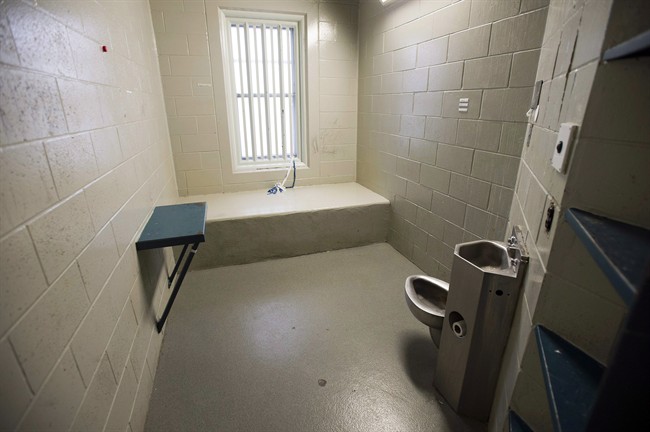When Judge Sheila Whelan shot down an attempt to designate Marlene Carter a dangerous offender, she said the public would be “shocked” by the way Carter, an inmate with a history of abuse and severe mental illness, was treated in prison.

Now the Crown is appealing that decision, arguing that to protect the public Carter must be incarcerated indefinitely.
READ MORE: Court declares mentally ill female prisoner not a dangerous offender
Carter, 43, has spent much of the past several years tied down to a bed, a board, a chair – often for so many weeks on end her muscles atrophied and she lost the ability to stand on her own.
She’s tried to kill and harm herself numerous times, smashing her head against any hard surface nearby so often and with such force she damaged her brain and reduced her already compromised cognitive functioning. She was pepper-sprayed at least 35 times in attempts by prison guards to stop her from hurting herself.
READ MORE: Tied down in solitary for years, is sick inmate a dangerous offender?
The corrections and medical staff at the Saskatoon Regional Psychiatric Centre where she was kept made repeated requests for her to be moved somewhere she’d be better treated.
And this summer, after narrowly dodging a dangerous offender designation, Carter was finally moved to a special centre in Brockville, Ont.: The St. Lawrence Valley Secure Treatment Unit is a facility designed to treat offenders with the most debilitating mental illness. It’s been shown to have much better results when it comes to rehabilitating male inmates and actually making them better; Carter is the first woman in a long-awaited federal pilot program to allow sick female inmates the same shot at recovery.
READ MORE: What if there were a way to help mentally ill women inmates, and no one grabbed it?

Get weekly health news
But Saskatchewan’s Crown argues Judge Whelan made a mistake, that she failed to properly assess the facts behind Carter’s crimes, which include hitting a prison guard while handcuffed and spilling hot water on a nurse while tied to a chair – both considered assaults with a weapon.
Dean Sinclair, the provincial Crown’s Director of Appeals, says their argument also takes into account assaults Carter allegedly committed outside of prison, many of which never resulted in charges.
“We’re saying that … Ms. Carter was a dangerous offender and should be subject to indefinite sentence,” Sinclair said.
“The intent is she remain in custody or be supervised so that the risk that she poses to the public is adequately managed. … We don’t want to see her in jail for the rest of her life unless she can’t be managed in the community.”
INVESTIGATION: Canada’s sickest inmates are locked in its deadliest prisons
The appeal comes as dismaying news to Carter’s lawyer Jim Scott.
“I’m just puzzled by the Crown’s attitude that they’re wanting to do this,” he said. “She would be in the custody of the Crown for the rest of her life. That is really something we want to avoid.”
While the Crown doesn’t care where Carter’s incarcerated, her lawyer worries she’d be moved back to a prison setting that’s proven “very harmful.”
“Her dignity is restored. And she’s telling jokes, she’s speaking much more clearly. I was hoping for an improvement, but I couldn’t have imagined as significant an improvement as she’s gone through.”
But the looming appeal, and the possibility Carter would be moved back to prison, aren’t helping.
“It’s worrisome … when somebody’s trying to recover and they’ve got this hanging over their head. It’s not that good.”
The Crown has about two months to submit a factum outlining its arguments; the defence has about a month after that to respond. An appeal will probably be heard early next year.
IN DEPTH: Death Behind Bars
READ: Saskatchewan Crown’s Notice of Appeal
READ: Judge Sheila Whelan’s ruling regarding Marlene Carter’s dangerous offender status








Comments